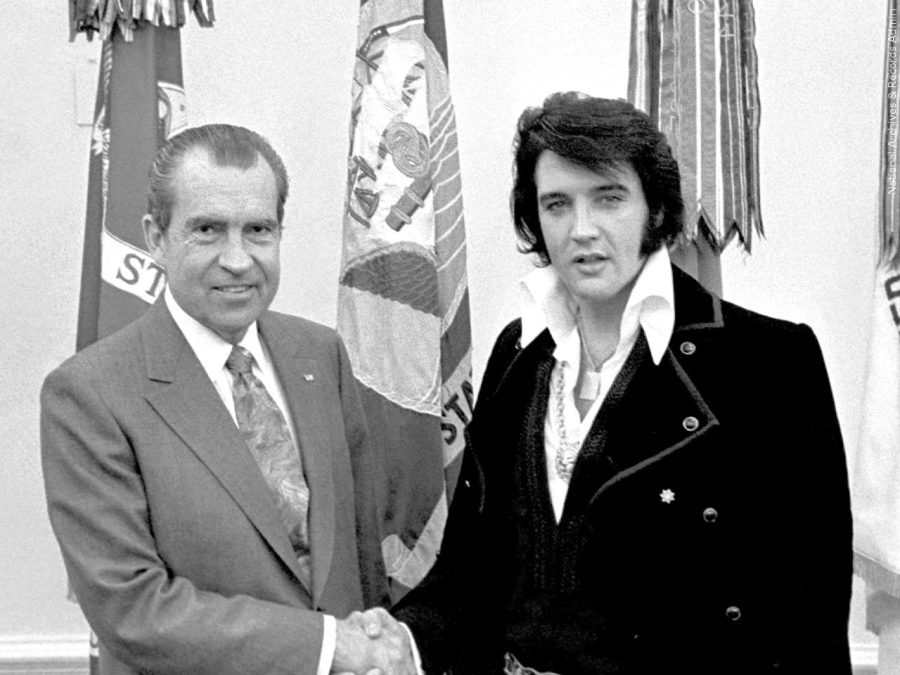Richard Nixon – One of the Greatest Presidents Who Should Have Never Been Forced to Resign
Impeachment is not a moral endeavor; it is the height of hypocrisy.
National Archives & Records Admin
Former President Richard Nixon (Left) and pop-icon Elvis Presley (Right) in Dec. 1970.
February 1, 2023
The 37th President of the United States – Richard Nixon – is among the greatest presidents in our history. Elected twice to the Oval Office – the second time by an overwhelming margin – Nixon’s accomplishments in office were groundbreaking, transformational and inspirational. Indeed, Nixon embraced a moderate, rather than ideological, paradigm to governance and a principled, not partisan, approach to leadership. In fact, even a cursory glance at President Nixon’s accomplishments demonstrated that, under his leadership, the United States prospered economically and forged partnerships internationally. For example, Nixon:
- Ended the military draft.
- Created the Environmental Protection Agency.
- Appointed largely originalist judges to the United States Supreme Court.
- Dedicated $100 million to begin a war on cancer.
- Signed Title IX, which prevented sex-based discrimination in federally funded programs and activities.
- Oversaw the desegregation of southern schools.
- Authorized the joint work between the FBI and Special Task Forces to effectively eliminate organized crime.
- Participated in the Strategic Arms Limitation Talks (SALT) with Soviet Secretary General Brezhnev.
- Signed the Anti-Ballistic Missile Treaty, which substantially reduced the threat of nuclear war between the United States and Russia.
- Became the first President to visit the People’s Republic of China, where he helped to normalize trade relations with the Chinese.
It should come as no surprise, therefore, that in 1972, President Nixon was re-elected in a landslide, with a mandate to lead and an agenda to effect transformative change in domestic and international policy.
Then, Watergate happened.
And that would ultimately lead Nixon, under threat of impeachment, to resign from office, with so many promises unfulfilled and accomplishments unrealized. But that resignation should have never happened. Congress should have never sought to impeach Nixon, particularly in light of his policy and legislative successes, and his actual role in Watergate.
To be clear, Watergate was a third-rate burglary performed by low-level, junior-varsity henchman who were on Nixon’s re-election committee and seeking intelligence on, among other things, the Democrats’ strategy for the 1972 re-election campaign. Unquestionably, this was a criminal act and indisputably, it was morally reprehensible.
But Nixon never authorized the burglary.
Nixon never even knew about the burglary until after it happened.
Given these facts, and Nixon’s overwhelming success as President, why was he impeached? Because he covered it up, often lying to his colleagues and Congress about the extent of his knowledge after he became aware of the burglary. It was the coverup, therefore, not the crime that led Nixon, under threat of impeachment, to resign. The threat of impeachment, however, and subsequent resignation, should never have occurred. It led to the loss of a great leader and ushered in an era of American politics that was characterized by partisanship, polarization, and political gamesmanship.
This opinion may seem controversial, but the basis for this conclusion is not. To begin with, and as stated above, Nixon never authorized or even knew about the burglary until after it happened. Furthermore, at the time of the burglary, it was widely known that the mainstream media, which is overwhelmingly liberal, hated Nixon, and that the Democratic members of Congress were searching for something – indeed anything – to undermine his political power and reputation with the American people. Given this context, what was Nixon supposed to do after he was informed of the burglary? Have a press conference and give the media – and Congress – precisely the ammunition to attack him relentlessly and undermine his legislative agenda? Think about if you were in Nixon’s shoes. What would you have done?
The most likely answer is precisely what Nixon – and former President Bill Clinton – did when faced with damaging scandals. You would cover it up due to fear of the political, not necessarily legal, repercussions. President Clinton, for example, famously held a press conference in which he stated, “I did not have sexual relations with that woman, Ms. [Monica] Lewinsky.” Well, sure enough, Americans soon learned that Clinton had oral sex with Lewinsky in the Oval Office, and they had the displeasure of learning about the infamous blue dress. Of course, like Nixon, Clinton covered it up too – and if you are honest with yourself, you would too. This is not to say that the conduct of these two men was not reprehensible. It is to say that the coverups were not nearly as reprehensible – or contrary to human nature – as critics, most of whom are politically biased, would suggest.
And the nature of the coverup underscores another critical point that should have prevented the threat of impeachment and Nixon’s eventual resignation. Put simply, Nixon never acted with the requisite corrupt motive that relevant federal statutes required. Specifically, the coverup was not designed to evade legal responsibility for the burglary (nearly everyone involved served time in prison), but to minimize the political fallout that would invariably accompany discovery of the burglary. This is not a distinction without a difference, because corrupt conduct, if entirely politically motivated, is not sufficient to satisfy the statutory elements upon which impeachment was predicated.





